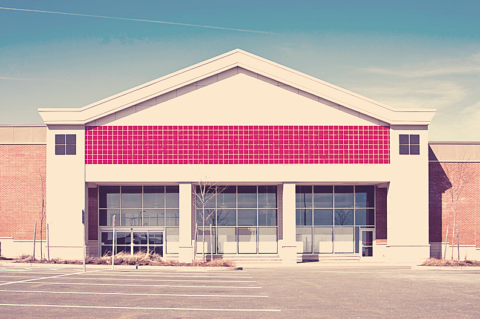in the suburbs. When I left, she was still open for business. Everything was bright and shiny and there were lines out the front door. When I abandoned her, things went downhill. There’s mold and sadness and a labelscar with my name on it over my bedroom door.
She summons me with a weak blue light that flashes on top of her head, letting me know she’s found my high school prom keychain and hot pink poufy dress, a pink and white knitted poodle on an empty wine bottle, various term papers and wide-lined alphabet practice, my yellowing christening gown, love notes from boys she’s read and read until they’re creased and fingerprinted.
Tiled with industrial squares cracked at the corners, she’s having my father pull up the tiles so they can install peel-and-stick fake wood flooring. He’s also in charge of maintenance but only wants to work part-time so there are water stains on the ceiling and a gaping hole where the staircase used to be.
Her kitchen features discounted crafty signs noting where the oven is, in case no one knows what it is. The backyard has an army of plastic flamingos and scripture flags and holiday signs from the seasonal section.
“Buy now,” she screams from her porch.
Obediently, I chase down her blue-light specials like I did as a child. Different each day. Different each hour. I never know what to expect. Will she send home expired canned goods or baby clothes or framed artwork with torn corners?
She’s the manager of this Kmart too. Every day she sweeps the tile, writes a schedule for the employees that don’t work there anymore, dons a red vest with her nametag on it. There’s a perpetual faded sign also screaming out front to the neighbors and her daughters and sometimes her husband who misreads it as flirting.
Going out of business
“I think today is the day,” she tells me as I carry boxes of things out to my car.
“You are still very much alive.” I tell her.
She shakes her head and her pile of blue-light special wigs that she pulled out of a dumpster along with the dinner she’s serving on mismatched melamine. The air conditioning has long since been turned off and she sits in a gray fake fur coat in a gray garden of garden center plants that are really sticks.
“Move in with me,” I ask her.
“People need to be here,” she tells me.
“Do you need to be here? I ask.
She hands me a plastic bag. I can see it is full of warm muffins made from an expired mix, my high school character shoes, one child’s mitten, a frying pan, balls of mismatched yarn, a hymnal, one of my now-water-stained senior pictures, six shampoo bottles with an inch of shampoo in each one, brass coated baby shoes, VCR tapes with scribbled sit-coms on the label, library books from another state, and a rusted Holly Hobbie lunch box. I take the bag.
She scans my face with her hands and waves me on.
My sister is waiting behind me for her shopping bag. She has not abandoned my mother in the suburbs. Her bag is full of fresh produce and cash and clean laundry and bonus gifts like wrapped scissors and pizza from the snack bar.



 The SmokeLong Grand Micro Contest (The Mikey) is now an annual competition celebrating and compensating the best micro fiction and nonfiction online.
The SmokeLong Grand Micro Contest (The Mikey) is now an annual competition celebrating and compensating the best micro fiction and nonfiction online.